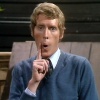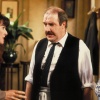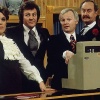As we all know, one of the best sources of comedy comes from heightened differences (think the always sharp Frasier – the funniest moments always involved the snobbish finery of the Crane brothers crashing full tilt into the opinions of blue-collar father Martin) and in British comedy you can’t emphasis difference better than by using the UK class system.
And so it was with Three Up, Two Down: the humour came from the vast social differences between Sam Tyler (Michael Elphick - Boon, Withnail & I) and his reluctant flat-mate Daphne Trenchard (Angela Thorne -To the Manor Born) and the arguments that came from this.
Sam’s son Nick (Ray Burdis - actor, writer, producer and director and whose brother Mark played Chris ‘Stewpot’ Stewart in Grange Hill) was married to Angie (Lysette Anthony – fantasy sci-fi film Krull, Auf Wiedersehen, Pet) and they’d just had their first child. Needing some financial help to pay the bills they planned to rent out their basement to bring in some cash and as luck would have it they had two prospective tenants, eager to move in immediately. As luck wouldn’t have it the two tenants were the couples’ in-laws. Both Sam and Daphne (Angie’s mother) wanted to take ownership of the flat and when neither would budge from this it seemed like their only option was for them both to move in and live together.
Both parents were widowed but that was about the only thing they had in common apart from their shared adoration of their grandson. Sam was a cheeky chappie Cockney; coarse and slovenly (Daphne once stated that if she wished to use the bathroom after Sam had been in there she had to deal with a ‘thick rim around the bath, hair in the plughole and assorted toenail clippings’) but with a basic kindness and morality underneath it all. Daphne hailed from Cheltenham and was uptight and snobby with a glare that could freeze molten lava, although you occasionally got to look past her disdain and see a glimpse of a lady who you felt would like to shake loose if she thought nobody was looking.
One of Daphne’s problems was the fact that she believed her daughter married beneath her: Nick was a photographer (and a ‘common’ one according to Mrs Trenchard) who shared his father’s East End accent and Daphne allowed her working class prejudice to conveniently overlook how much Nick loved her daughter and what a great dad he was to Joe.
Sam had a number of other personal habits that Daphne found repulsive: his taxidermy hobby (stuffed snakes and small mammals adorned the flat), his penchant for vests and, from series two, his friend Wilf (John Grillo – you’ll recognise him from hundreds of things although frustratingly for him you’ll probably never remember his name), a miserable zoo-keeper who Sam let move in to his room. She showed her contempt for both Sam and their forced situation through a number of pointed put downs (when Sam asked her if she had any plans for the day she replied ‘Only avoiding you as much as possible’) although Sam had a fine line in retorts. When the post arrived one day he went to get it for Daphne: ‘Oh, you’ve got a letter. If this person knows you as well as I do then it’s probably a death threat.’
In series two Daphne was wooed by Major Giles Bradshaw (Neil Stacy – Duty Free); he swept her off her feet with his charm but Sam was never convinced by the Major’s silver tongue and was determined to catch him out. Giles didn’t last all that long once Sam was on the case and he ended up in prison.
Sam realised early on that he and Daphne could have a romantic future together (how he saw this when she was always so vile to him I don’t know), but Daphne found the idea laughable (literally, the first time Sam asked her to marry him she collapsed into a fit of giggles). He never gave up on the idea and, as I’m sure you have guessed by now, she couldn’t stay angry with him forever. Over the course of the four series that ran on the BBC in the 1980s her defences inevitably came down and she discovered that they were more suited than she had first imagined. Their middle-aged romance was also helped along the way by Rhonda (Vicki Woolf), a neighbour who could see that they were obviously meant for each other once they could put their bickering aside.
The first series began on BBC1 on Monday 15th April 1985 at half past eight and ran for six episodes. Series two followed in 1986, series three in 1987 and the final series in 1989. All the series had six episodes except for series three, which for some reason had seven.
Like many other BBC programmes of that time (*takes deep breath* - Last of the Summer Wine, Are You Being Served, Sorry, Some Mother’s Do ‘Ave ‘Em, Yes Minister – phew - The Fall and Rise of Reginald Perrin, The Two Ronnies, To the Manor Born and more) Ronnie Hazlehurst was the composer of the theme music.
A pilot of the programme was made for U.S. television, although there were some differences…the title of this one was Five Up, Two Down. The premise was the same although in this one Angie has triplets rather than just the one baby. It was never made into a full series.
















Do You Remember Three Up, Two Down?
Do You Remember Three Up, Two Down?